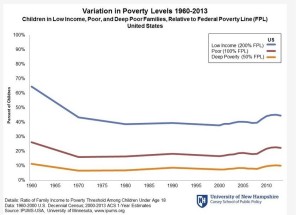Tax Credits that Support Citizen Workers
There are two tax credits that subsidize the low wages of working families, and individuals between 25  and 65 who are not dependents of another taxpayer — the Earned Income Tax Credit (EITC), and the Child Tax Credit. Refundable Earned Income Tax Credits and the Child Tax credit may help to fill the gap between wages and basic needs, allowing people to work and pay a little toward childcare, food, health care, housing and transportation. These tax credits may help to avert homelessness, but subsidies for basic needs programs are essential for the survival and healthy development of our nation’s children and their families.
and 65 who are not dependents of another taxpayer — the Earned Income Tax Credit (EITC), and the Child Tax Credit. Refundable Earned Income Tax Credits and the Child Tax credit may help to fill the gap between wages and basic needs, allowing people to work and pay a little toward childcare, food, health care, housing and transportation. These tax credits may help to avert homelessness, but subsidies for basic needs programs are essential for the survival and healthy development of our nation’s children and their families.
EITC was first enacted by in the 1970s by President Ford and was substantially increased by President Clinton in 1995. In 2013, the IRS estimates that 28 million citizens qualifying for EITC received over $66 billion in federal refundable tax credits in 2013. That year, the Child Tax credit protected approximately 3.1 million people living in poverty, including about 1.7 million children, and reduced the severity of poverty for another 13.7 million people, including 6.8 million children.
EITC for low-to-moderate income working people reduces the amount of federal taxes owed, and refunds the difference if the credit is larger than the debit. The same is true about the Child Tax Credit. In addition to the federal EITC, twenty-six states and D.C. have EITC to reduce state income taxes, and provide refundable income. Of the 26 States that have EITC, most offer less than a 15% refund, but those offering between 15 % and 25.5% are CT, DE, KS, MD, MA, NJ, and VA . The largest refunds come from NY at 30% VT, at 32%, D.C. at 40%.
The Child Tax Credit was enacted in 1997 and increased to $1000 per child in 2001 by President Clinton. It is a subsidy for each dependent citizen child under 17 years in families earning less than $110,000 annually. Some qualifications are the relationship to tax payer, and how long the child and payer have lived together in the U.S.
MA has increased their the EITC refund to 23% this summer in hopes of reducing the numbers of children living below the poverty line. The increase can bring as much as $1874.00 to working families, giving them a financial stability they have not had in years.

